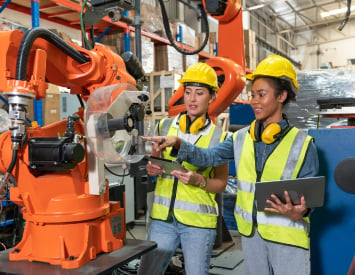The recent 5th Doctor of Engineering (DEng) Conference, by the Engineering Institute of Technology (EIT), brought together experts, students, and academics to explore the latest advancements and challenges in engineering. This year’s event highlighted cutting-edge research and the importance of deep learning, AI, and sustainable engineering practices.
Inaugural Session and Keynote Talks
The conference kicked off with an introduction by Indumathi V, Deputy Dean of EIT. In her opening remarks, she emphasized the significance of such conferences in fostering collaboration and innovation in engineering education. She noted that “this year’s conference has a fresh focus on how advanced technologies, like AI and deep learning, are being applied in real-world engineering problems.”
The expert presentations were highlighted as a major attraction, covering topics like metallic metamaterials and AI for medical diagnostics. Indumathi V also pointed out the introduction of practical workshops at future conference, indicating a shift towards providing attendees with hands-on skills. “There will be a stronger emphasis on student presentations, allowing emerging talent to showcase their research,” she added.
The key takeaway, according to Indumathi V, is the importance of embracing advanced technologies to stay ahead in the engineering world. “The landscape is forever shifting, and engineers need to be early adopters,” she emphasized. Attendees left with a robust understanding of how to apply these tools in their own work, and some clarity around sustainability which was a recurring theme in discussions.

Following the Deputy Dean’s introduction, Dr. Vishal Sharma, Senior Lecturer and DEng Coordinator at EIT, set the stage for the conference’s discussions, and Dr. Steve Mackay, Dean of EIT, delivered an engaging keynote titled “The Nuts and Bolts of Applying Deep Learning from an Engineering Perspective.” He discussed the transformative potential of deep learning in engineering applications.
Dr. Mackay elaborated on how deep learning technologies can enhance engineering processes, stating, “The great opportunity for engineers lies in their quantitative prowess, having strong foundations in mathematics and easily handling vast amounts of data from sensors and control systems.”
He highlighted that deep learning enables engineers to analyze data more effectively and identify patterns that would otherwise be impossible to discern through traditional methods. For example, it can improve fault detection in systems and optimize energy usage in smart grids.
However, Dr. Mackay also acknowledged the challenges engineers face when integrating deep learning into their work. “The quality of the data collected often requires significant cleaning and labeling,” he explained. Additionally, he noted a gap between engineering expertise and the technical know-how required for deep learning frameworks, which may necessitate further assistance.
Expert Talks and Student Presentations
The conference featured a range of expert talks, including one from Dr. Ma Qian from RMIT, who explored “Metallic Metamaterials for Advanced Engineering.” This session underscored the innovative materials shaping modern engineering.
Later in the day, students presented their research on diverse topics, such as building condition audits and renewable energy protection algorithms. These presentations are vital for encouraging new voices in engineering and ensuring fresh ideas emerge from the next generation of engineers.
Dr. Shasha Wang, an EIT civil engineering lecturer, coordinated the second session, which included insights on smart grid technologies by Dr. Shama Islam from Deakin University. She emphasized the importance of including student presentations in conferences like this, as they provide emerging engineers with a platform to share their innovative research.
Workshops and Advanced Research
The second day featured a workshop led by Dr. Milind Siddhpura focused on “AI Tools for Research.” This interactive session equipped participants with practical skills for leveraging AI in engineering research. Dr. Siddhpura shared insights on the most promising innovations in AI tools, such as creating mind maps and interacting with research documents to enhance understanding.
He also highlighted how the workshop format enhances the learning experience: “The ‘AI Tools for Research’ workshop provides a comprehensive roadmap for using AI throughout the research journey, from understanding topics to analyzing data.” This logical structure equips budding researchers with essential skills.
In addition to workshops, the conference included internal academic research presentations, such as EIT electrical engineering lecturer Dr. Hossein Tafti’s talk on photovoltaic systems.

Key Takeaways and Future Outlook
The conference concluded with a summary by Dr. Vishal Sharma, reflecting on the collaborative spirit and innovative ideas shared over the two days. Indumathi V’s concluding remarks reinforced the importance of continuous learning and adaptation in the engineering field.
The 5th DEng conference served as a platform for sharing knowledge, fostering collaboration, and inspiring the next generation of engineers. As industries evolve, such conferences play a pivotal role in ensuring that educational frameworks remain aligned with technological advancements and societal needs.
This year’s focus on deep learning, AI, and sustainability underscores the importance of integrating emerging technologies into engineering practices, making the conference a critical event in the engineering calendar.
By encouraging dialogue among students, academics, and industry professionals, EIT continues to lead the way in engineering education and innovation. These presentations highlight EIT’s commitment to integrating academic research with real-world engineering challenges.


